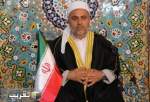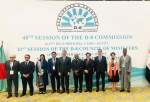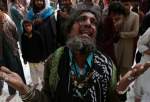"We do not know exactly when the end will come and the guidelines should be observed for a long period," Rouhnai told a meeting of the National Headquarters for Managing and Fighting the coronavirus in Tehran on Saturday.
"People should know that the epidemic will take long and today we are not in possession of a definite and clear end to the epidemic," he added. "We may have a long period ahead until we can have access to an approved and available vaccine."
The president noted that the country has no choice but to open factories and shops while simultaneously countering the highly contagious virus.
He further advised Iranians to observe health and safety norms, respect social distancing rules, use masks at gatherings and avoid wedding ceremonies or funeral processions.
Like many other countries, Iran is grappling with the coronavirus that first showed up in China in late December 2019 before spreading across the globe.
Over 167,000 Iranians have contracted the disease and 8,134 have died while more than 129,700 patients have recovered so far, according the latest figures released by the Health Ministry.
Elsewhere in his remarks, Rouhani urged Iranians to use internet platforms for their daily social activities as much as possible during the coronavirus pandemic.
"The real space should be our second priority, our first priority should be the cyberspace," he said.
Rouhani also enumerated four main tasks of the government in the current critical juncture, the first of which is the provision of health care supplies.
"Fortunately, all we need today for the heath and treatment sectors are produced inside the country with no shortages in this regard and scientific and research activities are properly pursued," he pointed out.
The second and third government tasks are providing people with basic goods and essential services including, water, electricity, gas and security, he added.
The fourth government responsibility is the provision of economic support packages, the president said. "These supports will continue as long as the coronavirus exists."
The Islamic Republic is fighting the coronavirus amid US sanctions which prevent the country from accessing necessary equipment and medicine. The US government has defied international calls to halt the coercive measures.
According to S&P Global Platts, rather than compelling the Trump administration to relax its oil sanctions regime, the global coronavirus pandemic and oil price crash is motivating an even more aggressive US oil sanctions policy.












